Starting an online store usually means picking a readymade e-commerce platform. You must have come across Shopify, BigCommerce, or Squarespace. These platforms help you launch quickly with built-in ecommerce website design features and templates similar to buying a suit off the shelf. It fits. Works well enough. And doesn’t cost much to begin with.
But what if your business starts to grow? What if your operations become more complex, your workflows unique, or your brand needs something that feels more personal? That off-the-shelf suit may no longer fit right or reflect your style.
That’s where a custom e-commerce solution comes in. Instead of working within a preset system, you get a custom ecommerce platform built specifically for your business, like a suit tailored to your exact fit, needs, and goals.
At Mobisoft Infotech, we build these custom e-commerce development solutions. Off the shelf works for some, but going custom can help you reach the next level. Let’s look at when and why a custom solution might be the right choice for you.
First, What Are We Comparing To? (The Off-the-Shelf World)
Off the shelf e-commerce platforms are popular for good reasons:
- Fast Setup: You can launch relatively quickly.
- Lower Initial Cost: Getting started often involves monthly fees rather than a large upfront custom e-commerce development cost.
- Built-in Features: They come with standard ecommerce platform functionalities ready to go.
- User-Friendly: Often designed for non-technical users.
But they have limitations:
- "Cookie Cutter" Feel: Your store might look similar to others using the same theme.
- Feature Constraints: You're limited to the features and integrations the platform offers or allows through its app store. Customizing core functionality can be difficult or impossible.
- Scalability Caps: You might hit performance or customization limits as your business grows complex.
- Transaction Fees: Some platforms charge fees on top of payment processor charges.
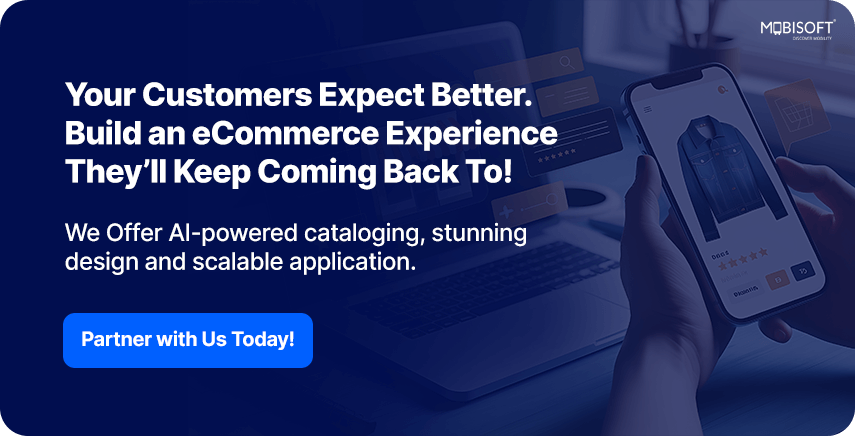
What Makes a Solution "Custom"?
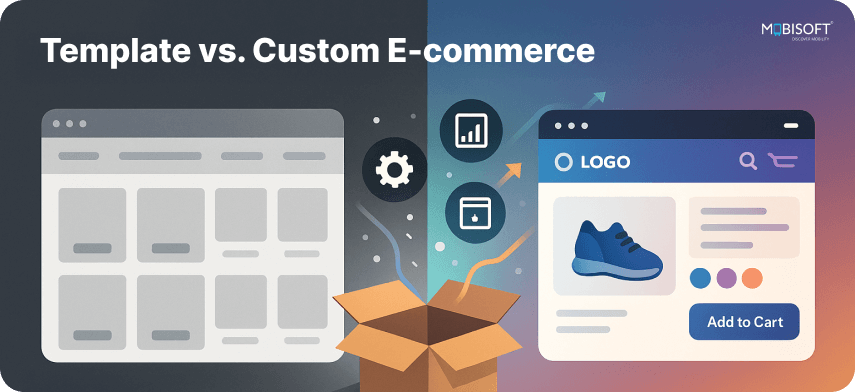
A custom e-commerce solution means the platform is built or tailored to match your exact business needs. Everything from features and design to ecommerce user experience design and tech stack is shaped around what works best for you.
That doesn't mean starting from scratch with every line of code. It's about using the right tools and frameworks to create a custom e-commerce for niche markets or complex operations.
Modern custom ecommerce development often involves:
- Leveraging Frameworks: Using foundational code libraries to speed up development.
- Headless Commerce: Building a unique frontend (customer-facing website/app) that connects via APIs to a powerful backend (which could be a customizable commerce engine or even specially built microservices).
- Composable Commerce (MACH Architecture): Selecting best in class, independent software components (for search, checkout, ecommerce personalization strategies, etc.) and integrating them seamlessly via APIs to create your ideal setup.
Let’s learn in detail about Headless Shopify Ecommerce Solutions for Your Business that can offer this unique flexibility for Shopify users.
The key takeaway is control, flexibility, and long term e-commerce ROI with custom solutions. You dictate how it looks, how it works, and what it connects to.
When Does a Custom Solution Become Necessary (or Highly Advantageous)?
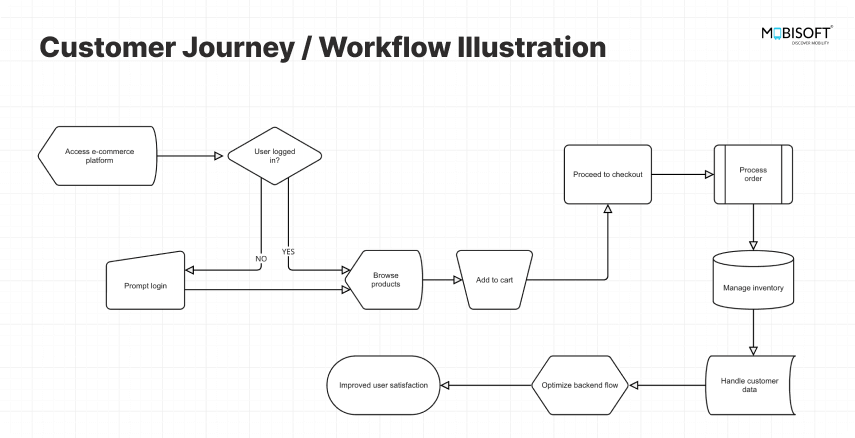
Moving beyond off-the-shelf often makes sense when you encounter situations like these:
Unique Business Models:
- You have complex subscription rules, tiered memberships with specific perks, intricate product bundling/configuration options, or a rental model that standard e-commerce platforms can't handle elegantly.
- Example: A B2B company needing highly specific pricing tiers per customer group, complex quote-to-order workflows, or e-commerce API integrations with specialized industry procurement systems.
Complex Integration Needs:
- You need deep, seamless integration with existing business systems like ERP (Enterprise Resource Planning), CRM (Customer Relationship Management), PIM (Product Information Management), warehouse management software, or legacy databases that standard platform connectors don't support well.
- Example: A manufacturer needing real-time inventory sync between their factory floor system and the online store something beyond basic stock updates that only custom e-commerce development can solve.
Highly Specific User Experience (UX) or Design:
- Your brand demands a truly unique, immersive, or unconventional online experience that goes far beyond standard themes and templates. You want complete control over the e-commerce user experience design and customer journey.
- Example: A luxury brand wanting a highly interactive, visually rich site that feels more like a digital art piece than a standard online store.
Need for Peak Performance & Scalability:
- You anticipate massive traffic volumes, have a huge product catalog, or require lightning fast performance under heavy load that shared off the shelf platforms might struggle with. A custom build can be optimized specifically for your performance needs.
- Example: A flash sale site that expects enormous traffic spikes in very short periods.
Data Ownership & Security Requirements:
- You need absolute control over your customer data, e-commerce security best practices, or need to meet stringent industry compliance regulations (like HIPAA in healthcare) that require specific security protocols.
Marketplace Functionality:
- You're building a platform where multiple vendors can sell their products (like Etsy or Amazon Marketplace), requiring complex vendor management, commission structures, and payout systems.
For example, healthcare businesses can greatly benefit from tailored delivery systems. Enhance Healthcare Workflow with Our eCommerce Delivery Solution to see how real-world logistics and compliance challenges were solved through custom architecture.
The Payoffs: Why Invest in Custom?
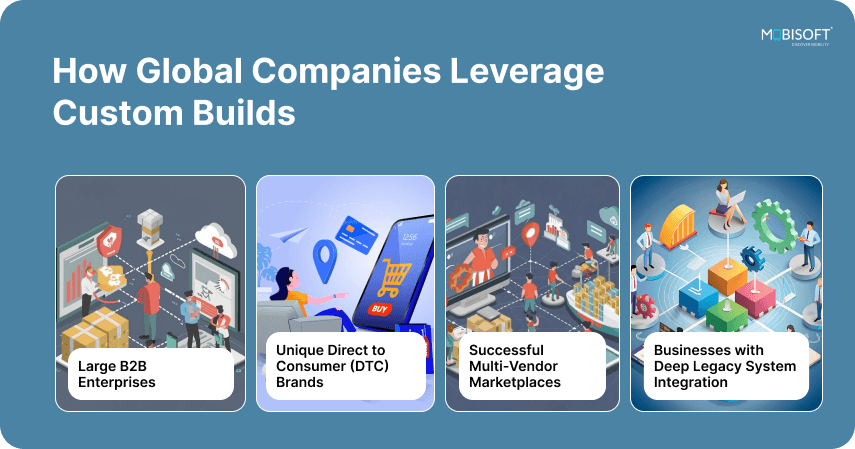
Choosing custom isn't just about solving problems; it's about unlocking significant benefits that drive profitability:
- Perfect Fit: The platform does exactly what you need it to do, streamlining operations and eliminating workarounds. Efficiency gains translate to cost savings.
- Scalability for Growth: A custom solution can be architected to grow with your business, handling more traffic, products, and features without needing a costly replatform later.
- Seamless Operations: Tight integrations mean less manual data entry, fewer errors, and a smoother flow of information across your business, reducing operational costs.
- Optimized Performance: Tailoring the tech stack leads to faster load times and a smoother user experience, directly impacting conversion rates and SEO rankings. Higher conversions = more revenue.
- Competitive Differentiation: A unique, branded experience helps you stand out from competitors stuck on generic platforms, building brand loyalty and attracting customers.
- Flexibility & Future-Proofing: You're not locked into a single vendor's roadmap. You can adapt, add features, or integrate new technologies as your business needs evolve. Modern headless/composable approaches make this even easier.
- Potential Long-Term ROI: While the initial investment is higher, you avoid recurring platform transaction fees, potentially lower app subscription costs, and build a valuable asset tailored to your business that can yield better returns over time.
Looking to improve your visibility while building your platform? Explore our SEO guide for e-commerce stores: Get found & boost sales to ensure your custom build also ranks well on search engines.
How Global Companies Leverage Custom Builds
While specific company details are often proprietary, we see clear patterns:
- Large B2B Enterprises: Companies selling complex industrial parts or services often require custom portals with client specific catalogs, contract pricing, and punch-out integrations with buyer procurement systems.
- Unique Direct to Consumer (DTC) Brands: Brands that built their identity around a very specific customer experience or product customization often opt for custom builds to ensure the technology perfectly matches their brand promise.
- Successful Multi-Vendor Marketplaces: Platforms connecting diverse sellers and buyers nearly always need custom ecommerce development due to the complexity of vendor management and logistics.
- Businesses with Deep Legacy System Integration: Companies requiring seamless connections between new e-commerce front ends and decades-old systems often find custom API integrations are the only viable path.
These companies invest in custom solutions not just for features, but because the tailored fit allows them to operate more efficiently, offer a superior customer experience, and ultimately, capture more market share and drive higher profitability than they could with a constrained, one size fits all platform.
Making the Choice: Is Custom Right for You?
Consider these questions:
- Complexity: Are your business processes, product structures, or integration needs highly unique or complex?
- Budget: Do you have the budget for upfront development (which is typically higher than starting on SaaS)?
- Timeline: Can you accommodate a longer development timeline compared to an off-the-shelf launch?
- Vision: Is a truly unique brand experience or specific functionality critical to your competitive strategy?
- Future Growth: Do you anticipate significant growth or complexity that might outstrip standard platforms?
Off the shelf e-commerce platforms work great in the beginning. But if you’re hitting limits, relying on workarounds, or your growth is constrained by your tech, it’s probably time to explore a custom e-commerce solution that can scale with you.
Conclusion: Your Business, Your Platform
Choosing the right e-commerce platform is a big step. Off the shelf options are quick and easy. But when your business needs more control, flexibility, and room to grow, a custom solution makes all the difference. It’s built to fit your needs, run smoothly, offer a unique customer experience, and scale with your goals.
Wondering if a custom e-commerce platform could drive your next stage of growth?
Working with the right e-commerce development company ensures your platform is not just functional but strategically aligned with your long-term vision.
At Mobisoft Infotech, we build tailored e-commerce solutions designed for your specific needs. We use the latest in headless commerce, ecommerce personalization strategies, and composable architecture to create scalable, secure, and conversion optimized platforms.
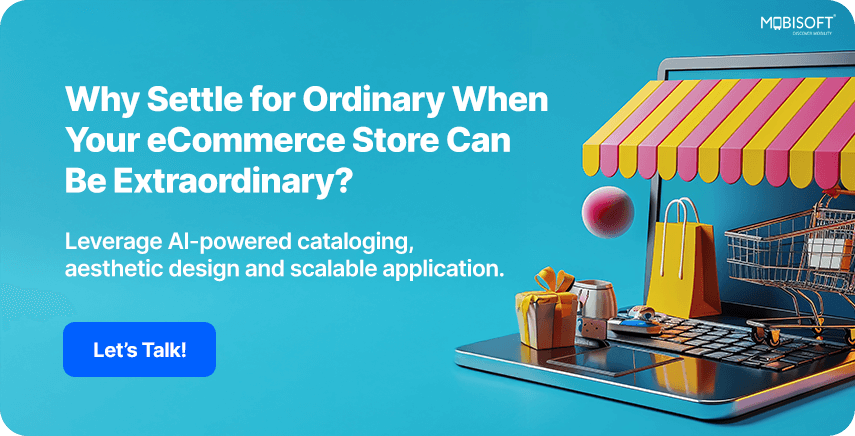

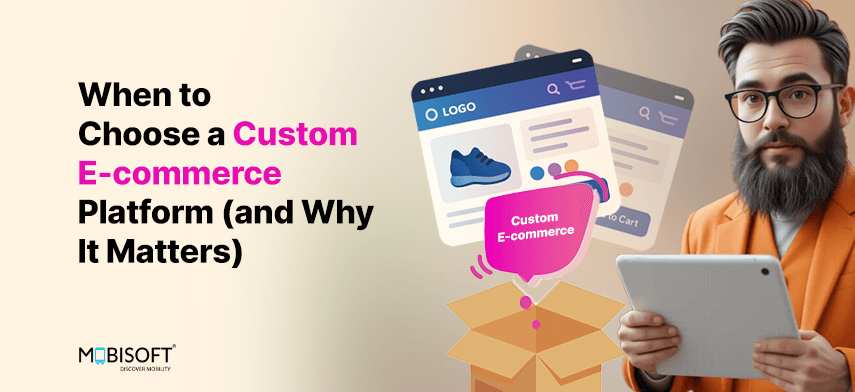


 May 20, 2025
May 20, 2025


